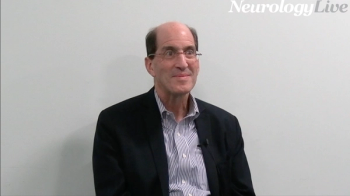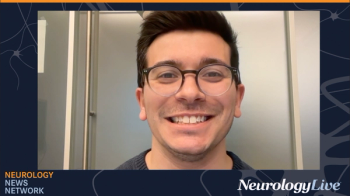
According to the median number needed to treat across the 3 analyses, an additional 8-11 individuals would need to be treated with rimegepant 75 mg to result in a comparable responder rate of at least 50% to atogepant 60 mg at week 12.

According to the median number needed to treat across the 3 analyses, an additional 8-11 individuals would need to be treated with rimegepant 75 mg to result in a comparable responder rate of at least 50% to atogepant 60 mg at week 12.

Adaptive DBS dynamically adjusts stimulation based on patient brain activity, improving therapy customization and motor symptom management in real-time.

The professor in the department of diagnostic radiology at City of Hope talked about using amyloid and tau PET imaging for diagnostic clarity in Alzheimer disease, particularly in complex and atypical patient presentations. [WATCH TIME: 10 minutes]

The newly announced sham surgery-controlled trial will include 102 patients with moderate PD testing several end points, such as change in ON-time without troublesome dyskinesia, over a 78-week period.

The chief medical officer at Stoke Therapeutics discussed recent developments for zorevunersen, including the significance of breakthrough therapy designation and its plan for a phase 3 trial. [WATCH TIME: 5 minutes]

The professor and chair of the Department of Molecular Pathobiology at NYU College of Dentistry discussed groundbreaking research on chronic pain, focusing on the discovery of new mechanisms involving nerve growth factor and its receptors.

The phase 2, placebo-controlled, crossover trial will test whether 50 mg once daily lorundrostat may relieve the severity of upper airway obstruction and reduce nocturnal hypertension.

The chief of neuroinfectious diseases and global neurology at Northwestern Medicine discussed a recently published study that highlighted Long COVID’s significant clinical and societal impact. [WATCH TIME: 5 minutes]

In the pivotal phase 3 Clarity AD trial, treatment with a subcutaneous autoinjector of lecanemab led to reduced rates of amyloid-related imaging abnormalities while maintaining similar bioequivalence levels to the original formulation.

The founding director of the Optimal Aging Institute at the NYU Grossman School of Medicine talked about a recent study that estimated the lifetime risk of dementia and its implications for prevention, care, as well as societal planning. [WATCH TIME: 5 minutes]

Eligible participants are ambulatory adults aged 50 or older with mild cognitive impairment or mild Alzheimer disease, confirmed by clinical assessments and a positive amyloid PET scan, and who meet specific health and safety criteria.

Recent research investigated how HSV-1 infection affects tau phosphorylation through the cGAS-STING-TBK1 pathway, highlighting potential new therapeutic strategies for Alzheimer disease.

James Wheless, MD, FAAP, FAAN, FAES, Le Bonheur Chair in Pediatric Neurology at the University of Tennessee Health Science Center, shared insights on his presentation from AES 2024, focusing on stiripentol, an FDA-approved treatment for Dravet syndrome.

A duo of experts from NYU Grossman School of Medicine talked about a new study that identified deficiencies in acetyl-L-carnitine and free carnitine as potential blood biomarkers for Alzheimer disease. [WATCH TIME: 5 minutes]

Using a delayed-start analysis, treatment differences on outcomes of ADAS-Cog13 and ADCS-ADL continued to grow larger during weeks 144 and 192 of the open-label extension.

At the 2024 ECTRIMS Congress, the associate professor of clinical neurology at Keck School of Medicine of USC talked about recent research that highlights the preclinical phase of multiple sclerosis. [WATCH TIME: 9 minutes]

Here's some of what is coming soon to NeurologyLive® this week.

An ongoing phase 2a study of RAP-219 involves adult patients with drug-resistant epilepsy who have an implanted responsive neurostimulation (RNS) device, allowing for real-time monitoring of intracranial EEG data.

The professor in the department of diagnostic radiology at City of Hope discussed a newly updated published guideline for amyloid and tau PET imaging geared towards improving Alzheimer diagnosis. [WATCH TIME: 5 minutes]

Test your neurology knowledge with NeurologyLive®'s weekly quiz series, featuring questions on a variety of clinical and historical neurology topics. This week's topic is on restless legs syndrome.

NeurologyLive® will provide in-depth coverage of conferences in 2025, highlighting advancements in diagnostics, treatments, and multidisciplinary care across multiple neurological conditions.

The SORT-IN-2 trial is a Phase 1b/2a proof-of-concept study evaluating the therapeutic potential of VES001, a novel oral treatment designed to target GRN mutations, which are the root cause of frontotemporal dementia.

Neurology News Network. for the week ending January 11, 2025. [WATCH TIME: 4 minutes]

Take 5 minutes to catch up on NeurologyLive®'s highlights from the week ending January 10, 2024.

The professor and chair of the Department of Molecular Pathobiology at NYU College of Dentistry provided a clinical overview of preclinical research identifying a new receptor for nerve growth factor that plays an important role in pain signaling. [WATCH TIME: 4 minutes]

Between those infected and uninfected with COVID-19, investigators observed no differences in symptom trajectories, assessed through SymptoMScreen.

The senior vice president of research at The ALS Association discussed the need for standardizing ALS diagnosis across institutions to reduce delays and ensure timely treatment. [WATCH TIME: 4 minutes]

Mind Moments®, a podcast from NeurologyLive®, brings you an exclusive interview with Russell Lebovitz, MD, PhD. [LISTEN TIME: 22 minutes]

Results from the open-label phase 1/2 study of tividenofusp alfa demonstrated positive effects on evidence-based surrogate end points in participants with Hunter syndrome.

Masoud Toloue, chief executive officer at Quanterix, and Nicholas J. Ashton, PhD, senior director of the Banner Health Fluid Biomarker Program, discussed the Simoa technology required to test for p-tau217, the expanding understanding of this biomarker, and the next steps for advancing this research.